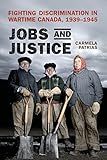Jobs and Justice : Fighting Discrimination in Wartime Canada, 1939-1945 / Carmela Patrias.
Material type: TextPublisher: Toronto : University of Toronto Press, [2011]Copyright date: ©2011Description: 1 online resource (256 p.)Content type:
TextPublisher: Toronto : University of Toronto Press, [2011]Copyright date: ©2011Description: 1 online resource (256 p.)Content type: - 9781442611283
- 9781442693876
- 331.13/3097109044 23
- online - DeGruyter
| Item type | Current library | Call number | URL | Status | Notes | Barcode | |
|---|---|---|---|---|---|---|---|
 eBook
eBook
|
Biblioteca "Angelicum" Pont. Univ. S.Tommaso d'Aquino Nuvola online | online - DeGruyter (Browse shelf(Opens below)) | Online access | Not for loan (Accesso limitato) | Accesso per gli utenti autorizzati / Access for authorized users | (dgr)9781442693876 |
Frontmatter -- Contents -- Acknowledgments -- Introduction -- Part One: Invidious Distinctions -- 1 Employment Discrimination and State Complicity -- Part Two: Discrimination Is Sabotage: Minority Accommodation, Protest, and Resistance -- 2 Jews -- 3 Other Racialized Citizens -- 4 The Disenfranchised -- Part Three: Ambivalent Allies: Anglo-Saxon Critics of Discrimination -- 5 Mainstream Critics and the Burden of Inherited Ideas -- 6 Labour and the Left -- Part Four: Anglo-Saxon Guardianship -- 7 Anglo-Saxon Guardianship -- Conclusion -- Notes -- Index
restricted access online access with authorization star
http://purl.org/coar/access_right/c_16ec
Despite acute labour shortages during the Second World War, Canadian employers—with the complicity of state officials—discriminated against workers of African, Asian, and Eastern and Southern European origin, excluding them from both white collar and skilled jobs. Jobs and Justice argues that, while the war intensified hostility and suspicion toward minority workers, the urgent need for their contributions and the egalitarian rhetoric used to mobilize the war effort also created an opportunity for minority activists and their English Canadian allies to challenge discrimination.Juxtaposing a discussion of state policy with ideas of race and citizenship in Canadian civil society, Carmela K. Patrias shows how minority activists were able to bring national attention to racist employment discrimination and obtain official condemnation of such discrimination. Extensively researched and engagingly written, Jobs and Justice offers a new perspective on the Second World War, the racist dimensions of state policy, and the origins of human rights campaigns in Canada.
Mode of access: Internet via World Wide Web.
In English.
Description based on online resource; title from PDF title page (publisher's Web site, viewed 01. Dez 2023)


